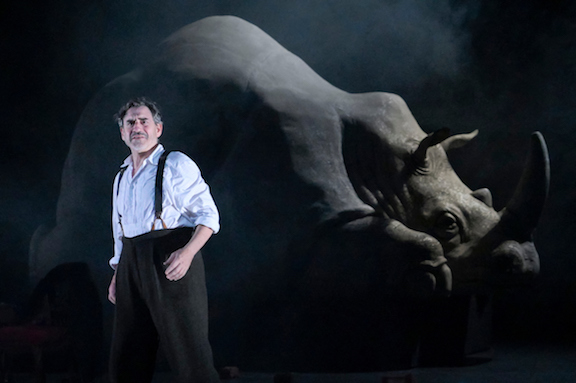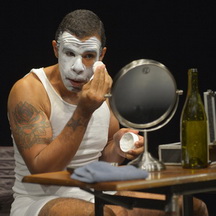It’s not necessary to decode Ionesco’s 1959 play, Rhinoceros, the playwright himself thoroughly explained its meaning. Hearkening back to his youth in Romania, he informed the public via interview of his university life, when one by one his colleagues abandoned their opposition to fascism and became part of the Iron Guard, the ultra nationalist, anti-Semitic paramilitary group founded in 1927 that rose to power in Romania at the beginning of World War II.
Ionesco’s meaning is easy to project into the play. As, again one by one, the characters first see, then admire, then join the herd of rhinoceros that inhabit the play. Gone however are the specific instances: the conniving leaders of the movement, the ideology, the politically based alignment and realignment. Rather the rhinoceros appear out of nowhere, with seemingly no agenda except the brute force of their presence and their insistent need to rampage. The characters who see and then become them do so instinctively. First they are afraid, then they see beauty and an inexplicable rightness in being a rhinoceros, in joining and following the herd.

It is this lack of ideological meaning, perhaps, that makes the play absurdist. That and the fact that people don’t turn into rhinoceros; their DNA won’t have it.
Directed by Tony Award winning Frank Galati, A.C.T.’s thoughtful and comedic production of Rhinoceros begins with the two characters Gene (Matt DeCaro) and Beringer (David Breitbarth) meeting at an outdoor café on a street in France. Rather than three-dimensional, the sets designed by Robert Perdziola are brightly and expressively painted onto a scrim. Characters exit and enter through a split in the scrim, confirming their reality is nothing more than a painted curtain. The scrim-painted sets throughout hide and reveal huge three-dimensional sculptures of rhinoceros to answer our imagination with a more substantial and real portrait of the animal in grotesque proportions.
Gene is a pompous creature, filled with platitudes and socially correct expectations. He easily slides into a litany of criticism. Beringer is always late, Gene complains, and he drinks too much. Beringer, it seems, needs on-going correction. Beringer’s reaction is mild, he is all the things Gene claims, but even more he is incorrigible. Affably agreeing to Gene’s criticism, he orders a drink. Breitbarth does a great job as the disaffected but good-hearted ne’er-do-well.
Gene’s onslaught is broken by an off-stage rumbling that becomes louder and louder. Eventually he leaps to his feet. There is a rhinoceros kicking up its heels in the town square. A woman’s cat is trampled.
The next scene is set in the newsroom where Beringer works as a clerk. “Fake news. Fake news,” someone calls out. But this slim tie to contemporary events rings slightly hollow in the theater. Does the play reflect our present day? Surely its origins in the rise of xenophobic fascism in between-the-wars Romania has an analog in the rise of xenophobic authoritarianism in the US.
Not really. If anything, today’s American populace is suffering from a hard-headed tribalism, one marked on the right by an inability to compromise to the perceived other side, which in turn requires them to ignore the obvious, or, on the left, to accept a political reality that requires people to support candidates who are less than perfect and who carry with them political pasts that compromise both their present and their future. No one is changing into anything.
Besides the protagonist Beringer, his nemesis Gene, and his heartthrob Daisy, the play is filled with small and amusing roles. The newspaper agency owner, Mr Papillon (Danny Scheie), as flitty as his name suggests. Mrs Boeuf (Trish Mulholland), the wife of a colleague turned rhino, who performs the enviable act of jumping on her transmogrified husband’s back and riding off. Mr. Botard (Jomar Tagatac), the skeptic and confirmed conspiracy theorist. Mr Dudard (Teddy Spencer) Beringer’s amiable, but dutiful and well-educated, colleague. Everyone enjoyed playing their role with madcap abandon.
On two occasions, in the midst of the chaos of transformation, Daisy (Rona Figueroa) burst through with formidable renditions of Edith Piaf’s militaristic sounding love song, “Je ne regrette rien”: non, rien de rien. The song was a huge success in 1960 the year following the opening of Rhinoceros, and Piaf dedicated it to the French Foreign Legion, a regiment of which was involved in the failed 1961 coup d’état against Charles de Gaulle over the Algerian War; they adopted the song when the resistance failed.
Yet another tip of the hat to war and the absurd.
– Jaime Robles
Rhinoceros continues at A.C.T.’s Geary Theater through June 23. For tickets and information, visit act-sf.org.
